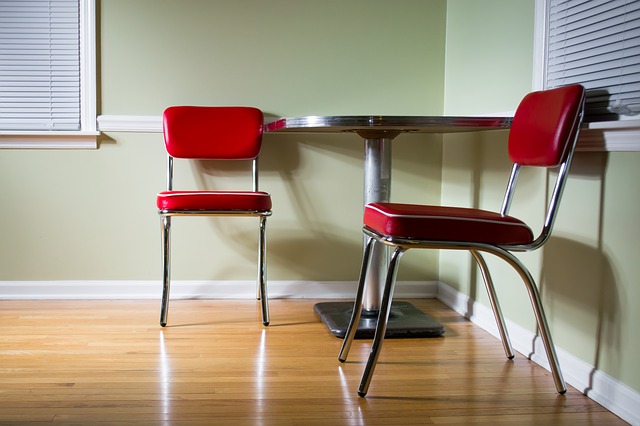How to clean vinyl floors with white vinegar
Even in the most high-traffic areas of a home, vinyl tile and laminate flooring is stylish, resilient, and long-lasting, but it is far from invincible. Cleaning vinyl flooring is a simple and inexpensive operation, and it’s simple to keep the material’s attractive appearance with regular maintenance.
To eliminate dust, hair, and filth, first vacuum or dry mop the floor. Then use a wet mop and a cleaning solution to finish the job. Commercial vinyl floor cleaners are available, but apple cider vinegar and water may be used to make a simple, efficient cleaner for vinyl flooring.
The acidity of the vinegar dissolves grime without leaving behind a soapy residue. Sheet vinyl flooring comes in 6 or 12 foot wide sheets, and tile vinyl flooring comes in 9′′x9′′ or 12′′x12′′ tiles. While sheet flooring is more water resistant and quicker to install, many homeowners choose vinyl tile, which has the appearance of ceramic tile but is less expensive.
Tips for Maintaining Vinyl Floors
Wax polishes will leave a coating on the floor that will gradually accumulate. There’s a simple and inexpensive technique to make your floor shine: In the vinegar and water cleaning solution we mentioned previously, add a few drops of baby oil. Dirt and dust ruin any floor’s finish, so place doormats in front of outside doors to keep dirt out. Knowing how to clean vinyl flooring helps ensure that it looks great and lasts for many years.
The technique for cleaning wood floors and engineered hardwood floors is the same regardless of the cleaner you use. Using a cloth or a sponge mop, saturate a rag or a sponge mop in your cleaning solution. Ensure the mop is damp, not wet, by wringing it out well. Use the cleaner to mop the floor, being careful not to get too much liquid on it.
Vinyl Flooring Cleaning Guide
Spills should be cleaned up as quickly as possible and plain water should be mopped often. Here are a few pointers and approaches for more thorough cleaning:
- To remove food stains such as those caused by grape juice, mustard, ketchup, tomato sauce, and other similar substances, prepare a paste of baking soda and water and gently rub the stain until it vanishes. Remove any traces of baking soda with a thorough cleaning.
- When used with common household solvents, a soft, nylon-bristle brush can assist in the removal of a variety of stains. Lipstick, hair dye, and pen stains can all be removed using rubbing alcohol. To clean crayon, paint, and marker stains, use mineral spirits. To remove acetone-based nail polish stains, use an acetone-based remover.
Dirty and Damage Prevention
The first step is to try to prevent filth, stains, and abrasions from happening in the first place. Another tip is to carry furniture across the floor on a sheet of plywood or paneling to avoid scuff marks or tears in the vinyl. Vinyl floors, laminate countertops, ceramic sinks, and toilets can all be cleaned with vinegar, but not everything. Avoid using vinegar as a cleaning agent in these five areas of the house because there are safer or more effective alternatives.
Floors in Hardwood
Because vinegar is highly acidic, it can degrade or destroy hardwood floors’ finishes. Getting hardwood floors to shine is a difficult task for many individuals, but vinegar can dull the lustre of your flooring over time. Instead, use a hardwood floor cleaner to improve and protect your floor’s lustre and surface. When mopping with too much water or any cleaner, keep in mind that damp hardwood floors can deform or harm the surface.
Floors that don’t require any waxing
The acidity of vinegar will remove the lustre and sheen of a no-wax floor, which requires a specialized cleaning, just as it does with hardwood floors. Vinegar will not provide the gentle sudsy action necessary to clean no wax vinyl. Furthermore, the vinegar can damage the top surface of the flooring, causing them to dull and darken with age and continuous use. On no-wax vinyl floors, use a sponge mop to drive cleaner into grooves and remove grime.
Odors in Carpet
When it comes to pet stains on carpet, some people recommend using vinegar, but it doesn’t perform as effectively as an enzymatic carpet cleaner. Vinegar can cover up odours, but it won’t get rid of the source of the problem. You’ll need a pet-specific carpet cleaner to fully get to the bottom of the issue. These carpet cleaners can help break down the stain, preventing your pet from smelling their previous error and repeating it in the same location. Enzymatic carpet cleaners are available at grocery stores and other cleaning supply retailers.
Grout That Isn’t Sealed
Vinegar should never be used to clean grout that hasn’t been sealed or needs to be resealed. Vinegar degrades the grout by penetrating the air voids. By etching or eroding away the grout over time, vinegar will impair its state. The vinegar, on the other hand, will not be an issue if you have regularly sealed your grout. Once a year, inspect your grout to see if it needs to be re-sealed.
Surfaces in Stone
The use of vinegar can etch and harm stone surfaces like granite or quartz countertops. Check with your stone provider for recommendations on vinegar and the finest cleansers; in many cases, all you need is water and a soft cloth to keep your stone looking fantastic. Many people recommend using a dedicated stone cleaner on granite countertops, but for the most part, ordinary water and a microfiber cleaning cloth will suffice.
Don’t Do This
When it comes to cleaning vinyl flooring, there are a few areas of care and products to avoid:
- When vacuuming vinyl flooring, avoid using a “beater bar” attachment since it might damage the surface.
- Never scrub with steel wool or harsh scrubbers.
- Avoid using paste wax and polishes with solvents.

